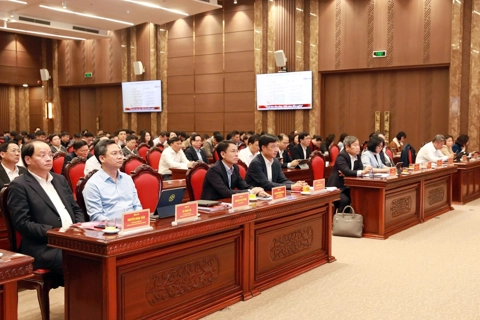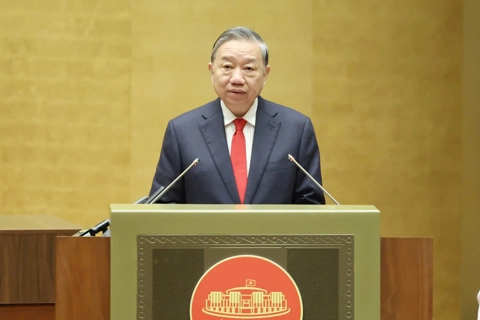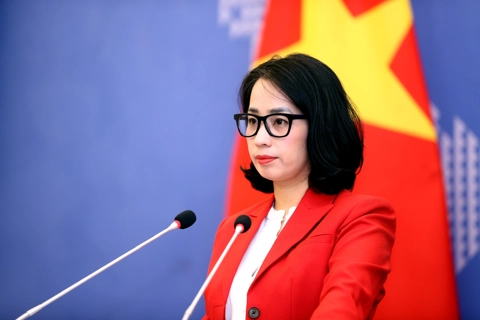Lawmakers pass constitutional amendment for two-tier local government
This historic step lays the constitutional groundwork for streamlining the political system and advancing institutional reform.
THE HANOI TIMES — Vietnam’s National Assembly on June 16 unanimously passed a resolution to amend several articles of the 2013 Constitution, paving the way for a streamlined two-tier local government structure across the country. All 470 deputies present voted in favor of the resolution.

Overview of the National Assembly session on June 16. Photos: quochoi.vn
The revised Article 110 stipulates that the Socialist Republic of Vietnam's administrative units are organized into two levels: subnational units comprising provinces and centrally governed cities, and sub-provincial units as defined by law. There will also be special administrative-economic units established by the National Assembly.
Under the resolution, the creation, dissolution, merger, division and boundary adjustments of administrative units must be conducted with public consultation and in accordance with procedures stipulated by the National Assembly.
Local governments will consist of People’s Councils and People’s Committees tailored to rural, urban, or island characteristics. The organizational structure for special administrative-economic units will be determined upon their establishment by the National Assembly.
Following the official abolition of the district level, newly formed administrative units resulting from the reorganisation will not elect positions such as chairman or vice chairman of the People’s Council, heads of its committees, or chairman, vice chairman, and members of the People’s Committee. Neither will they elect National Assembly delegation heads and deputy heads.
The National Assembly Permanent Committee will appoint the chairman or vice chairman of the People’s Council and heads of its committees upon nomination by the Party committees.
The prime minister will appoint the chairmen and vice chairmen of the People’s Committees of these provinces and cities. The Standing Committee of the provincial People’s Council will appoint the members of its committees, as well as the chairmen and vice chairmen of the People’s Council and the People’s Committee at the sub-provincial level.
For sub-provincial administrative units, the Standing Committee of the People’s Council will appoint members of the People’s Committee.

National Assembly deputies vote on the resolution to amend the Constitution.
The amended Constitution also reaffirms that the Vietnam General Confederation of Labor, the Vietnam Farmers' Union, the Ho Chi Minh Communist Youth Union, the Vietnam Women's Union, and the Vietnam Veterans Association are political-social organizations under the Vietnam Fatherland Front.
These organizations are established voluntarily and represent and protect the lawful and legitimate rights and interests of their members. Their personnel and operations are unified under the Fatherland Front system.
Vice Chairman of the National Assembly Nguyen Khac Dinh noted that the draft resolution was made publicly available for comment on May 6. It received over 280 million responses from citizens and levels of government.
“All feedback, from the public, government agencies, local authorities, experts or academics, was reviewed comprehensively and objectively,” said Dinh. “No comment was excluded simply because it reflected a minority viewpoint.”
Although the amendment touches only five of the Constitution’s 120 articles, Dinh noted that proposals not adopted were still studied and reported in full to lawmakers.
Following the adoption of the constitutional amendments and the revised Law on the Organization of the Local Government, the National Assembly Standing Committee will issue 34 resolutions on the restructuring of administrative units at commune level, along with a resolution on the restructuring of administrative units at provincial level.
These modifications will provide a comprehensive and consistent legal foundation for implementing a uniform, two-tier local government model across the country. The newly formed administrative units will officially begin operating on July 1, 2025.
The resolution on constitutional amendments takes effect immediately upon approval.
Minister of Home Affairs, Pham Thi Thanh Tra, said that the three-tier local government system has made a significant contribution to national development.
"It is now time to transition to a streamlined, efficient two-tier model to meet the demand of a new development phase," she said.


![[Infographic] Vietnam after provincial mergers](https://cdn-media.hanoitimes.vn/resources2025/1/users/60/screenshot-2025-06-12-162049-1749720079.png?w=480&h=320&q=100)









